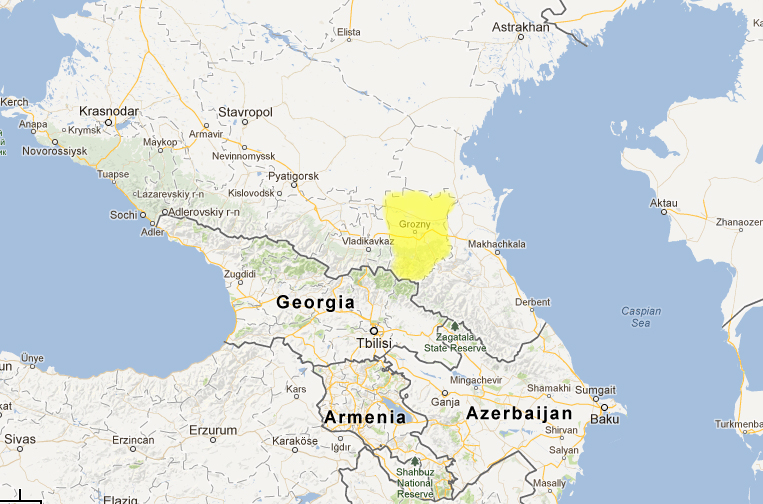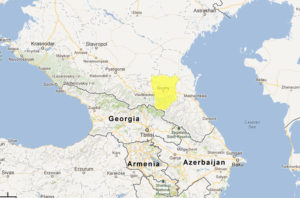

Editor's note: With the recent terrorism attack at the Boston Marathon, many are curious to know more about Chechnya, its volatile history and Chechen terrorism. As part of its mission to be better aware of current events, Living Ready is offering this piece to shed light on Chechen terrorism and this unstable part of the world.
Since the terrorist attacks at the Boston Marathon, the words “Chechnya” and “Chechen” are back in the popular vernacular. It's important to understand a bit about these words and the history behind them.
The first refers to a land locked country in Eastern Europe that is smaller than Riverside County, California, and is under the political control of Russia. The latter refers to the indigenous people who live there, though the people refer to themselves as the Nokhchi.
A History of Chechen Terrorism
But to those of us with an ear to the ground for subjects closely related to the military and intelligence trades, neither term is new. For many of us, the Chechens have been on our radar since reports coming out of the two major wars fought in that country since the fall of the Soviet Union featured some of the most heinous and savage attacks that could be imagined.
Chechen guerrilla fighters, who have rebelled against Russia at least five times in the last century, had invaded and took hostage an entire hospital in 1995, bombed five apartment buildings in 1999, invaded and took hostage a theater in 2002 and a school full of children in 2004. Chechen terrorism made a brand for itself through these and other violent acts.
- Related: Be prepared for man-made attacks with this emergency readiness guide from disaster response authority Paul Purcell.
Who are the Chechen People?
The first important point about the Chechen people is that, unlike the majority of people living in Russia and surrounding areas, they are predominantly Muslims whose adherence to Islam goes back over a millennium. These differences have led to historical conflicts that saw the Chechen people fighting foreign forces attempting to occupy their homeland.
Prior to their conversion, Chechens lived in tribes known as tieps, and still do in some mountainous regions of Chechnya. Within these tieps, children are taught to fight from an early age, ancient ideas of honor and warriorship remain, and bigoted intolerance of their lowland counterparts, who have become intermixed with Russians, Georgians and other nationalities, is common place.
Where Does Chechen Terrorism Originate?
In the past two decades, radical Chechens Islamists have not succeeded in beating back the advancement of Russian forces in their homeland. They have become hugely dependent on outside sources of weapons and money while trying to do so.
As a result, Chechen terrorism has been exported around the world. Chechen fighters have been dispatched to conflicts around the world in order to spread their inherited savagery and intricate knowledge of IEDs and Soviet-era weapons to militant ranks in other countries. Much as they have done in the Balkans and Kashmir – the historic avenues into Western Europe and India respectively – the jihadists have made the North Caucasus, the region in which Chechnya is located, an important theater.
With the American attitude toward Russia being one of caution since the days of the Cold War, programs have been opened to accept refugees and asylum seekers from the North Caucasus region. While the vast majority of those who have come are innocent people fleeing the constant fighting in their homeland, it's not hard to see how a Chechen, influenced by radicalism, could use such programs as an easy way into the United States and other Western nations in order to commit acts of terror sanctioned by jihadist leaders.
Was the Boston Marathon Incident an Act of Chechen Terrorism?
While the Tsarnaev brothers' connection to Chechnya may turn out to be nothing more than simple ancestry, the older brother's six month trip to the North Caucasus cannot be overlooked. Terrorist training camps and strongholds exist throughout that region and someone, somewhere had to teach him to build the volatile and sophisticated explosive devices used in the Boston Marathon attacks.
As if by some bizarre twist of fate, my first full length novel, Veil of Civility, was published on April 2, 2013, and deals with an organized attack on America by Chechen Islamists. I mention this not only as an obligatory plug for the book, but also to underscore my feelings upon learning the identities of the alleged Boston Marathon bombers.
As someone who has heavily researched both the region and the people of Chechnya, my blood froze. I was frightened at the very real possibilities of what could be coming next if these men were part of a larger group. With the whole of the northeastern U.S. law enforcement chasing after these men would they (and any unidentified allies) barricade themselves inside a hospital or school as they have in their homeland? Would the people in those buildings suffer the horrifying fates of previous hostages?
Fortunately, that didn't happen. But I hope you'll take time to study Chechnya and its history, as I did, for a better understanding of world events and the Tsarnaev case as it moves forward.
From rolling blackouts to hurricanes, floods to tornadoes, power can go out at a moment's notice. If the grid fails, the PowerPot will keep you charging! The PowerPot thermoelectric generator converts any heat source directly into power that charges your USB handheld devices. Get Yours Now


![Best Concealed Carry Guns In 2025 [Field Tested] Wilson Combat EDC X9S 1](https://gundigest.com/wp-content/uploads/Wilson-Combat-EDC-X9S-1-324x160.jpg)


![Best 9mm Carbine: Affordable PCCs [Tested] Ruger Carbine Shooting](https://gundigest.com/wp-content/uploads/Ruger-Carbine-Shooting-100x70.jpg)
![Best AR-15: Top Options Available Today [Field Tested] Harrington and Richardson PSA XM177E2 feature](https://gundigest.com/wp-content/uploads/Harrington-and-Richardson-PSA-XM177E2-feature-100x70.jpg)
